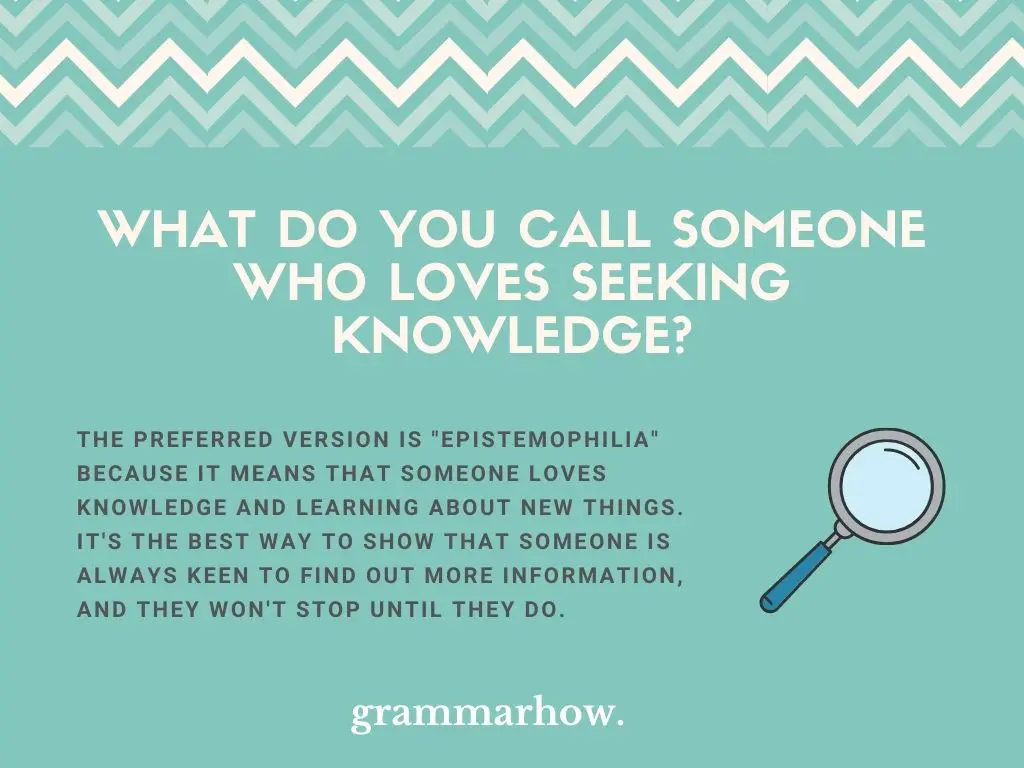People who love to learn don’t depend only on classrooms or professors. They seek answers to every question; their minds are always clouded with ‘how’ and ‘why.’ They have an innate desire to please their inner curiosity and dig deeper until their thirst for answers quenches.
What would you call such a person?
What would be a suitable expression or word for a person passionate about searching, researching, learning new things, and acquiring immense knowledge? Someone who questions everything, looks for answers, and learns with deep understanding.
This is the question I had in mind while deciding the name of this website. Autodidact was the first word that came to my mind, but the name had to be more generic so that people could remember and return to the website more often.
Well, there are many words for the same. Here is a list of the most noteworthy ones:
Autodidact
According to Oxford Dictionary, it means “A self-taught person.” It formed out of the English word Auto (self) and the Greek word didact (teach). In other terms, someone who has acquired knowledge or learned a subject without seeking help from a teacher or formal education institution.
Instead of calling a computer technician, you would fix it on your own.
Philomath
According to Merriam-Webster, it means “A lover of learning: scholar,” especially a mathematics student. This word originated in Greece and was used as a possessor of knowledge in multiple fields.
Polymath
A more profound word for this loveable expression. A polymath is a person whose expertise lies in different subjects. The knowledge is used to solve a specific problem by learnings from every perspective. Polyhistor is another term to describe the same.
Epistemophilic
“Edison had an epistemophilic personality.” This states that Edison had an excessive love or reverence for knowledge. It can be used for – the impulse to inquire.
Sophophilic
Used to describe a person who loves to gather knowledge with a higher emphasis on wisdom. Aristotle and Socrates were the greatest sophophiles of all time.
“There are no foolish questions, and no man becomes a fool until he has stopped asking questions.”
Charles Proteus Steinmetz
Philosophile
A person who loves to learn about philosophy. A love for a certain kind of thinking and approach toward a specific problem. Such a person is always involved in questioning, arguing with their notions and beliefs, and trying to change one’s mind.
Bibliophile
A person who loves books. Bibliophile or bibliophilism is the act of loving books. It may also be known as “Bookworm” for someone who loves reading or reads them for content.
Sapiosexual
It is formed from two Latin words, Sapien (Wise or Intelligent) and Sexualis (Sexes). A person who finds intelligence to be the most attractive feature of a human being. I have often quoted this word several times in my writings. This should be known and used more often by the masses.
Inquisitive
An inquisitive person is intellectually curious, eager for knowledge, and likes to inquire, research and ask questions.
Curious
The most crucial trait of any knowledge lover. If you’re curious, you want to know what makes someone special happy?
“Curiosity is the very basis of education and if you tell me that curiosity killed the cat, I say only the cat died nobly.”
Arnold Edinborough
Amore
Known as the name given to a person who has a deep inner need for quiet, a desire to understand, analyze the world they live in, and learn the deeper truth of this universe.
Erudite
Having or showing great knowledge, mastery, or learning. Possessing or displaying erudition. “An erudious scientist.”
Multipotentialite
Someone who has many different interests and creative pursuits in life. This term is used for someone who displays aptitude and excellence across multiple disciplines like art, economics, and science. Emile Wapnick popularized it in the TED talk Why Some of Us Don’t have One True Calling.
Neophilia
According to Collins Dictionary, it means a tendency to like anything new or a love of novelty. Neophilic is a person who has a fondness for, or obsession with, novelty and change. It is considered a personality trait.
Its opposite is neophobia which means fear of anything new or unwillingness to try anything new.
Learnaholic
The suffix “-holic” is added to a word to denote an addiction to it. Examples: workaholic, readaholic, and chocoholic. Similarly, learnaholic is someone who is addicted to learning and does it more than required.
Wonk
Used in an informal context. According to Cambridge Dictionary, a wonk is a person who works or studies too much, especially someone who learns and knows all the details about something. It relates to enthusiastic interest and excessive attention to minor details in a specialized field such as finance, politics, and science.
Pantomath
A person who wants to know or knows everything. Used to denote a great individual who has achieved the pinnacle of learning and understanding. Finance and advisory companies often use this word to convey relations to extensive expertise.
Leonardo da Vinci was one of the best-known knowledge lovers. He opened corpses to learn how the human body functions, played with candles and canvas to see how shadow works and observed water flow to create mechanics. His life was filled with exciting experiments. To learn better, watch this documentary.
What if the most precise word for this expression hasn’t been coined yet? It is time to put your mind to work. Here is one I came up with, a combination of two Latin words – Curiosus (Curious) + Amator (Lover) = Curiosamator. Make yours and share with this community of knowledge.
Want to start learning new things every day? Start here: 50+ Websites to Learn New Things Everyday
Some people really love to learn about new things. It might help to know of a few words we can use to describe these people (who love to seek knowledge). This article will help you to come up with the best words for such cases.
What Do You Call Someone Who Loves Seeking Knowledge?
We could share plenty of examples to use to talk about lovers of knowledge. Maybe one of these will be most suitable for you:
- Epistemophilia
- Philosopher
- Knowledge seeker
- Avid Learner
- Geek
- Philomath
- Curious
- Inquisitive
- Philonoist
- Thirst for knowledge
- Inquiring mind
The preferred version is “epistemophilia” because it means that someone loves knowledge and learning about new things. It’s the best way to show that someone is always keen to find out more information, and they won’t stop until they do.
Epistemophilia
“Epistemophilia” uses the Greek suffix “-philia” to show that someone “loves” something. In this case, it means that they love “knowledge,” which is why it’s such a great word to use for this case.
The definition of “epistemophilia,” according to Merriam-Webster Dictionary, is “love of knowledge.”
Here are a few ways to use it:
- My epistemophilia makes it so much more enjoyable for me to get through lessons. I can’t wait for another day!
- I love knowledge, and I think they call that phenomenon epistemophilia! Whatever it is, I’ve got it!
- I’m an epistemophile. You’ll always find my nose buried in a book or browsing forums online!
Philosopher
A “philosopher” is somebody who is constantly questioning and studying the meaning of life. They will always look for new ways to answer difficult questions, which often shows that they’re happy to possess knowledge that others might find boring.
The definition of “philosopher,” according to The Cambridge Dictionary, is “someone who studies or writes about the meaning of life.”
Here are some examples:
- As philosophers, it’s our duty to make sure we keep practicing our knowledge until we know what’s what!
- You are a philosopher, which explains why your mind can think in the way it does. I simply couldn’t do anything like that!
- He’s a philosopher and loves to find out more information about just about everything!
Knowledge Seeker
A “knowledge seeker” is a simple way to refer to somebody who loves to find out more knowledge about things. They will “seek” it out until they find it, and they do not care how long it might take them.
The definition of “seeker,” according to The Cambridge Dictionary, is “a person who searches for something or tries to find or obtain something.”
These examples will help you with it:
- As a knowledge seeker, I always look for the best answers to life’s most difficult questions.
- I’m a knowledge seeker, which is why I don’t believe things at face value. At least not until I’ve verified them!
- He’s too much of a knowledge seeker for me! No one should be that smart! I don’t want to be around him!
Avid Learner
“Avid learners” can refer to any subject. However, if you are “avid,” it means you are always keen and eager to learn more about something, and you won’t stop until you’re satisfied (which usually never happens).
The definition of “learner,” according to The Cambridge Dictionary, is “a person who is still learning something.”
Here are a few examples to help you with it:
- I’m an avid learner, so I’m happy to learn whenever I can! Do you think you could pick out some books to help me with that?
- She’s my most avid learner, and she’s very ambitious on top of that!
- He’s an avid learner, and I think you’ll be able to get a lot out of him! He’ll make a great tutor for you!
Geek
“Geek” means that someone has a lot of knowledge on a subject and is always happy to learn more. Often, “geeks” are self-proclaimed, and their knowledge closely relates to their favorite hobbies or subjects they’re most comfortable with.
The definition of “geek,” according to The Cambridge Dictionary, is “someone who is very interested in a particular subject and knows a lot about it.”
These examples will help you with it:
- I’m a geek, and I’ll admit that any day! I’m just happy to keep learning new and interesting things about my hobbies.
- You’ll find that she’s as much of a geek as you are! You’ll certainly hit it off when you start speaking with her.
- Don’t worry; you’re a geek, and that’s okay! We all love you, and we love that you can share such interesting facts with us!
Philomath
A “philomath” is somebody who loves to learn. They will often be the most attentive people within a classroom and will try to answer as many questions as they can. They are always looking for ways to improve their learning experience.
The definition of “philomath,” according to Merriam-Webster Dictionary, is “a lover of learning.”
Check out these examples to see how it works:
- He’s a philomath, which explains why he is always happy to be the first in and last out of the classroom.
- I can’t stand her philomath trait! It’s my least favorite thing about her because it makes me feel stupid.
- You need to stop acting like such a philomath! You’ll run out of friends if you keep it up!
Curious
“Curious” works well to show that someone is interested in learning and knowledge. While they might not possess it at first, they will ask questions to make sure they fully understand something that they might not have come across before.
The definition of “curious,” according to The Cambridge Dictionary, is “interested in learning about people or things around you.”
Some of these examples should help you with it:
- I’m very curious, and I can’t turn my brain off! I think that’s why I’m always hungry to find out more information.
- They say that I’m too curious for my own good! I say that you can never get enough knowledge and information in this world.
- I think you’re more curious than you need to be. Sometimes, it’s okay not to know something!
Inquisitive
“Inquisitive” means that someone always strives to discover more information about things. It works well to show that someone is keen to learn, and they will listen to anybody who is happy to explain how certain things happen or work.
The definition of “inquisitive,” according to The Cambridge Dictionary, is “wanting to discover as much as you can about things, sometimes in a way that annoys people.”
Here are a couple of examples to help you with it:
- I’m very inquisitive, and I’ll always make sure to find the best way to complete a task.
- He’s our most inquisitive student. If you ask him any question, he won’t rest until he’s figured out the answer and given it to you.
- You need to find someone who is as inquisitive as you are. Otherwise, no one else will be able to keep up!
Philonoist
The definition of “philonoist,” according to The Oxford Lexico Dictionary, is “a lover of knowledge.”
Some of these examples might help you with this one:
- As a philonoist, I find that knowledge is the most beautiful thing in the world. You have got to have it if you want to learn from it.
- For some reason, he calls himself a philonoist. I don’t even know what that means, but I know it makes him sound pretentious.
- She’s a philonoist, which is why she’s always studying and trying to find new ways to do things!
Thirst For Knowledge
“Thirst for knowledge” is a great way to show that someone is “thirsty” for more information. This means that they’re always eager to learn new things (as if they are always eager to drink water to quench their thirst). It’s a great metaphor to use.
Here are a couple of examples that might help you with it:
- I have a real thirst for knowledge. I will always make sure to update myself on all the most important things going on at the time!
- We need to find someone with a thirst for knowledge. Then we can guarantee that they’ll be interested in doing this job.
- You have a keen mind and thirst for knowledge! If only I had met you a few years ago; we would be so much further ahead already!
Inquiring Mind
“Inquiring mind” means that someone is always looking for answers. They will usually ask questions that will help to further their understanding of certain things, which is a helpful way for someone to learn new things they didn’t already know.
These examples will help you make more sense of it:
- Joseph has a really inquiring mind, which is why so many of his teachers think he’s going to amount to great things.
- I like to think that I have an inquiring mind, and I will always make sure to find the best sources when learning new things.
- Her inquiring mind makes it much harder for me to get anything past her! It’s very annoying!
You may also like: 10 Words For A Person Who Loves To Share Knowledge
Martin holds a Master’s degree in Finance and International Business. He has six years of experience in professional communication with clients, executives, and colleagues. Furthermore, he has teaching experience from Aarhus University. Martin has been featured as an expert in communication and teaching on Forbes and Shopify. Read more about Martin here.
Предложения:
love to learn
На основании Вашего запроса эти примеры могут содержать грубую лексику.
На основании Вашего запроса эти примеры могут содержать разговорную лексику.
я бы хотела научиться
Я бы хотел узнать
Actually, I’d love to learn how to collaborate rather than being faster to get it published before them.
На самом деле, я бы хотела научиться сотрудничать, а не быть быстрее, чтобы получить его опубликованные перед ними.
I’d love to learn more about you.
I’d love to learn even 1% of the huge amount that he knows.
Я бы хотел узнать хотя бы 1% от того огромного количества информации, которой владеет он».
I’d love to learn more about your services and what you do.
I’d love to learn more about it.
I’d love to learn to shoot some.
No, but I’d love to learn.
Say to your boss, I’d love to learn more about the accounting side of our operation.
If so, I’d love to learn that as well.
I’d love to learn how to make these…
Being a foreigner, I’d love to learn.
Have you ever thought to yourself, I’d love to learn a foreign language but I’m just too darn busy.
Думали ли вы когда-нибудь про себя: «Я хотел бы выучить иностранный язык, но… занятость…
I’d love to learn more about these knives and how to use them.
I’d love to learn that language!
While I’m not an obsessive Moomin fan (sacrilege, I know) I’d love to learn about her life and her inspiration for creating something so utterly bizarre.
И хотя я не одержимый поклонник муми-троллей (да, я знаю, это святотатство), я бы хотел больше узнать о ее жизни и о том, что вдохновило ее на создание таких причудливых странностей.
I’d love to learn more about the Apostle Paul and share this with my mom and husband.
I’d love to learn what other ways you are now using to promote content across the different inbound and paid marketing channels!
Мне бы хотелось узнать, какие другие способы вы используете для продвижения контента по различным входящим и платным каналам маркетинга.
I don’t, but I’d love to learn!
I’d love to learn if there’s a particular type of cheese that will work best, how to heat the cheese, and any other tips that you can provide.
Очень хотелось бы узнать, есть ли определенный тип сыра, который будет работать лучше, как топить сыр, и любые другие советы, которые вы можете предоставить.
Результатов: 26. Точных совпадений: 26. Затраченное время: 104 мс
Documents
Корпоративные решения
Спряжение
Синонимы
Корректор
Справка и о нас
Индекс слова: 1-300, 301-600, 601-900
Индекс выражения: 1-400, 401-800, 801-1200
Индекс фразы: 1-400, 401-800, 801-1200

The Love Language® Quiz
For couples, singles, teens, and children.
Take this quiz to discover your primary love language, what it means, and how you can use it to better connect with your loved ones.
Start
You may print, share, or save your results for future reference — they will not be saved automatically.



Discover even more with additional quizzes

By
Last updated:
December 7, 2022
There are many effective ways to learn English vocabulary—and you can find the perfect one for you right here.
For some people, simply memorizing a word’s definition is enough. Others need entertaining or unique techniques to truly remember a word.
No matter what type of learner you are, we’ll show you how to learn English vocabulary successfully.
Contents
- Make Vocabulary Building Easier by Knowing Your Personal Learning Style
- These 13 Questions Will Reveal the Best Way to Learn English Vocabulary for You
-
- 1. Do Keep To-do Lists?
- 2. Do You Love a Good Conversation?
- 3. Do You Spend Your Weekends Playing Board Games?
- 4. Are You a Movie Buff?
- 5. Are You Good at Spotting Patterns?
- 6. Does Traditional Studying Work for You?
- 7. Are You a Writer (or a Future Writer)?
- 8. Are You Detail-oriented?
- 9. Are You a Bookworm?
- 10. Do You Learn by Doing?
- 11. Do You Love to Travel?
- 12. Are You a Social Butterfly?
- 13. Are You Curious and Always Asking Questions?
Download:
This blog post is available as a convenient and portable PDF that you
can take anywhere.
Click here to get a copy. (Download)
Make Vocabulary Building Easier by Knowing Your Personal Learning Style
What kind of learner are you?
Some people learn best by listening, others learn best by writing. You can’t know which learning tips and methods will work best for you until you know which kind of learner you are.
For example, if you remember words better when you write them down, you should try something fun and productive that involves writing. Try writing a blog.
If you remember words better through repetition, use English vocabulary exercises to boost your knowledge.
It all depends on how you learn best.
Once you figure that out, you are ready to start really learning!
If you are not sure which learning style works best for you, then you can try all of the suggested ways to learn English below. You will learn a lot about yourself and your brain by trying different methods.
These 13 Questions Will Reveal the Best Way to Learn English Vocabulary for You
Words are all around us. Sitting down and looking up words in a dictionary is not the only way to learn English words. You can improve English vocabulary by talking with English speakers, watching TV shows in English, writing in a journal… we’ll show you all of it and more below.
Remember, you may answer “yes” to more than one of our questions below. That’s okay! You can try multiple methods to learn English vocabulary, and mix and match the best ones for you.
1. Do Keep To-do Lists?
Your best way to learn English vocabulary: write down all the new words you hear.
If you’re the kind of person who loves keeping lists—like grocery lists, to-do lists for errands, project ideas, etc.—then use that to your advantage.
Keep a vocabulary list to remember new words that you encounter in English. Put this list somewhere portable (easy to carry around) like a little notebook or your phone, so you can access it from anywhere.
As you find words you don’t know, write them down. Make sure to keep plenty of space between words so that you can write more about the words later. When you get the chance (at the end of the day, or at the end of the week) find out what these words mean. You can write the definition however you want, translated to your native language, copied from the English dictionary or written in your own original words.
However you do it, we recommend also writing down the part of speech (e.g., verb, noun, adjective), different versions of the word (for example, if you write down the word “fish” you could also write down information for fishing, fishy, fisherman, etc.), and a full sentence using the word.
After you have been recording lists for a while, go back and read your old lists. How well do you remember those words from the older lists? Take any words you have forgotten from your old lists and add them to your new list. This is a good way to make sure you continue to improve English vocabulary as you advance.
2. Do You Love a Good Conversation?
Your best way to learn English vocabulary: use new words in conversation.
It can be easy to forget about words you’ve already learned as you move on to new ones. This is especially true for common words and words that you’re not sure how to use.
Try using your new words during the week as often as you can. The more you use the words in English conversations, the better you’ll remember them.
An English language exchange offers a great opportunity to use your new English words in real conversations. If you’re not able to have as many English conversations as you’d like, keep a diary and simply write about your day using the words, or just talk to yourself!
3. Do You Spend Your Weekends Playing Board Games?
Your best way to learn English vocabulary: play English-language board games.
Who said that studying can’t be all fun and games?
English board games like Scrabble offer great ways to learn new words.
There are lots of games you can play to strengthen your vocabulary. In fact, you can find a list of vocabulary board games right here!
Games are a good way to learn because they make learning fun, and they help give you context for your new words. That means you’re giving the word you learn an extra meaning.
For example, you might remember the way that the word was used during the game. You might remember your friend laughing about how the word was used. You might remember that it was very hard to think of that word the first time while playing! Having a real-life memory attached to that word makes it much more memorable.
4. Are You a Movie Buff?
One great way to learn English vocabulary: watch real English language movie clips online.
One of the best ways to learn new vocabulary words is to hear them being used. When you’re talking to an actual person, you might not have time to write down any new words or to look them up in the dictionary.
That’s why videos are a great option for vocabulary learning. Movie clips specifically can help you improve your English vocabulary without being overwhelming. Some virtual immersion platforms make use of movie clips and other videos to teach English.
FluentU, for example, has a dedicated section for excerpts from movies and TV shows. Each video has interactive subtitles that you can click for definitions and example sentences. And you can take a review quiz afterward to test your knowledge of the material.
5. Are You Good at Spotting Patterns?
Your best way to learn English vocabulary: group similar English words together.
As we already mentioned, it is better (and easier) to learn new vocabulary words by giving them some context. One way to do this is to remember words in a sentence. This is a great option because you will not only know the word, but you will also know exactly how to use it in conversation.
Another easy way to learn English vocabulary is to remember words by groups. If you just learned the word “humongous” (very large), you can memorize it by thinking of a group of words getting bigger and bigger—large, huge, humongous. This also gives the chance to learn even more words at the same time.
For example: large, humongous, gargantuan. What do you think “gargantuan” means?
6. Does Traditional Studying Work for You?
Your best way to learn English vocabulary: use English dictionary websites.
Sure, you can use an old-fashioned dictionary to look up a word. But many dictionary websites these days have so much more to offer!
Explore dictionary websites like Vocabulary.com and Dictionary.com and you’ll find lots of resources and things to do or read that can help you learn new words. Online dictionaries often have interesting word-related blogs, games you can play and “word of the day” newsletter subscriptions.
Merriam-Webster even has a learner’s dictionary (with a “word of the day” option that teaches you a new English word every day) with useful words for people learning English. Perfect!
7. Are You a Writer (or a Future Writer)?
Your best way to learn English vocabulary: keep an English writing blog.
Reading blogs is a nice way to learn new words, but writing a blog is even better!
You can start a free blog on many websites like WordPress and Tumblr. What you write in your blog and who sees it is all up to you. You can write about fashion or cats… or cat fashion—write about whatever interests you.
As you write, you will probably need to look up words in a dictionary. As you look up words, you will start to remember many of them! Using them in your blog gives them great context which will help your memory. You will learn exactly how to use them in writing.
Choose a list of words that you want to use before you write the blog. Writing with these words will help you practice and remember them.
Share your blog posts with friends and native speakers. Ask them for feedback. This will help make sure you used your words correctly.
8. Are You Detail-oriented?
Your best way to learn English vocabulary: break words into their parts.
Many words can be broken down into smaller parts. For example, the word “dictionary” comes from the Latin word dictio, which means “to speak.”
This is called the root of the word. A root word is a base used to create many words. Now that you know the root word dictio, you might notice it in other words too, like dictate, dictator and contradict. Even if you don’t know what the words mean, you now know that they have something to do with speaking.
Learning word parts is a great idea because you don’t just learn one word, you also learn other words that use these parts. You will also be better at guessing the meanings of new English words, because you will know what some parts of these words mean.
There are more parts to words than roots. Along with roots, words use prefixes (word parts that come in the beginning of the word) and suffixes (word parts that come at the end of a word).
Many dictionaries break down the word into these parts and tell you where these parts are from. You can find a list of word roots on LearnThatWord, and a more complete list that includes prefixes and suffixes on Macroevolution.
9. Are You a Bookworm?
Your best way to learn English vocabulary: read English books.
Reading is a good way to learn new words, but what you read can also make a huge difference in how much you learn.
Choose books that are a little bit challenging for you, and you will learn a lot more than if you read at your level. If you read a book at your level, you may already know all the words. If you read a challenging book, you will need to learn many new words.
You can also try reading special vocabulary books. These are fiction books that include over 1,000 vocabulary words and their definitions! These books are available to buy online, and can be found at ThriftBooks or by searching Amazon.
10. Do You Learn by Doing?
Your best way to learn English vocabulary: take English vocabulary quizzes.
For many people, memorization is simply not enough. You have to practice and apply what you’ve learned—in other words, “learn by doing”—to truly remember the information.

Try using quizzes to make sure you still remember each word you learned, and to remind yourself of the words you learned a while ago. There are many vocabulary quizzes you can use to test yourself. You can find some at Vocabtest, Merriam-Webster and Vocabulary.com, among many others. Don’t forget that FluentU will always keep you practicing the vocabulary words you learned while watching videos!
11. Do You Love to Travel?
Your best way to learn English vocabulary: link new words to English-speaking cultures.
There are a number of different kinds of English around the world. British and American English might seem the same, but there are many little differences.
If you love to travel and discover new cultures, consider how English words are used, pronounced or spelled in different cultures. This will make them seem more interesting and memorable to you—plus, it will be helpful if you visit different English-speaking countries!
The word color, for example, is spelled as “colour” in British English. British people used the words “brilliant” and “cheers” often, but Americans prefer to say “cool” instead of “brilliant” and “see you” instead of “cheers.”
This is also a helpful idea if you’re already focused on one specific type of English. When you are learning new words, keep in mind which country you plan to visit, live in or work in. You should learn British English if you plan to go to England, American English if you plan to go to the U.S., and so on.
12. Are You a Social Butterfly?
Your best way to learn English vocabulary: study new words with English learning friends.
Learning is easier and more fun when you do it with others!
Find a group of friends who want to learn English with you, get an online native speaking buddy or join a website with other learners. Whatever you choose to do, you will benefit greatly from working with others.
One excellent group learning program you can join is called Toastmasters. This group has meeting spots all over the world, and it helps people learn to speak in public. This can be a huge help to you if you have trouble speaking English with others!
Another great idea is to talk to other English learners on Facebook. There are many Facebook pages for English learners. Some are pages where English learners have created an online community for support and friendship. Other pages have actual native speakers helping the group learn. Find one, and your studying will suddenly get much easier.
13. Are You Curious and Always Asking Questions?
Your best way to learn English vocabulary: ask “what does that mean?” as often as you can!
Finally, never be afraid to ask questions!
If someone uses words you don’t understand, ask them “what does that mean?” Many people are very patient and understanding if you tell them that you’re learning English. In fact, many will actually enjoy helping you!
So, have you found your personal best way to learn English vocabulary? Don’t be afraid to try everything and discover how to learn English vocabulary in a way that works for you. Study hard but have fun, and before you know if you’ll have a gargantuan vocabulary!
Download:
This blog post is available as a convenient and portable PDF that you
can take anywhere.
Click here to get a copy. (Download)







